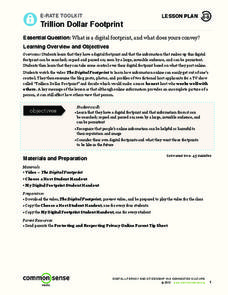Google
Be Internet Awesome
Teach the qualities of a digitally smart citizen with a set of lesson plans created by Google. Along with creating strong passwords, learners explore how to protect their privacy, when to stand up for others against cyberbullying,...
Common Sense Media
Digital Compass
Time to make some real world decisions in an interactive digital citizenship game. Choose a story and help the characters make the right decisions regarding Internet safety, cyberbullying, copyright, media literacy, appropriate online...
Google
Interland
"Be Internet Awesome" is the motto in a super cool digital citizenship interactive created by Google. Interland is made up of four lands that explore the importance of digital safety and helps young Internet users to be alert, strong,...
Common Sense Media
Cyberbullying: Crossing the Line
Teach pupils to identify different forms of cyberbullying, including harassment, deception, “flaming,” and threats to safety, as well as how to handle a situation in which cyberbullying might be involved.
Common Sense Media
Trillion Dollar Footprint
Learners explore their digital footprints, and discover how information they put online can easily be searched, copied, forwarded, and seen by a large audience.
Common Sense Media
Which Me Should I Be?
Impress upon learners the importance of considering how we identify ourselves online, and how this relates to overall considerations of safety and digital wellness.
Northwest Career & Technical Academy Foundation
Stand Up. . . Be InCtrl!
What is the difference between a bystander and an upstander? A collaborative project created through digital media helps the class understand that they can participate in an online community respectfully and responsibly. They consider...
Anti-Defamation League
Dealing with the Social Pressures that Promote Online Cruelty
Why do people engage in cyberbullying? What can be done about it? These are the questions middle schoolers consider in a very timely lesson. Participants view PSA announcements, read a case study, and participate in scenarios designed to...
Anti-Defamation League
Don't Let Hate Ruin the Fun: Youth and Online Games
Gamers unite! Take action against bullying and hate speech in online video games! After reading data that reveals the extent to which various age groups experience hate and, or harassment while playing video games online, groups develop...
Facing History and Ourselves
Identity and Choices
Timshel! Thou mayest! is the big idea in a instructional activity that reminds learners that they have choices about how they present themselves to others. To begin, individuals rate the degree to which the choices they make each morning...
Newseum
Is This Story Share-Worthy?
Young journalists use a "Is This Story Share-Worthy?" flowchart graphic to decide whether a story is worth sharing online. Instructors provide groups with fake news, poor quality stories, opinion pieces, biased news, and high-quality...
Nemours KidsHealth
Online Safety: Grades 6-8
Recognize risky behaviors and avoid them! That's the big idea behind two activities designed to teach middle schoolers to think critically about online safety. After reading background articles about protecting online identity,...
Nemours KidsHealth
Screen Time: Grades 6-8
How much screen time is too much screen time? Even before COVID, tweens were spending hours watching TV, playing video games, and connecting with their friends by smartphone and computers. Two activities from Kids Health get young...
Nemours KidsHealth
Cyberbulling: Grades 6-8
Cyberbullying is the focus of two lessons. First, scholars discuss what cyberbullying is, and examine a problem-solving approach to handling cyberbullying, then create brochures on the topic. Second, pupils discuss the effects...
Norton Life Lock
Digital Citizenship Bingo
Bingo! Tweens demonstrate their knowledge of the nine D's of digital citizenship by playing the game of Bingo. As instructors call out questions, individuals search their game cards to locate the answering image on their card.
Norton Life Lock
The Nine Ds of Digital Citizenship
A reference page identifies the nine Ds of digital citizenship—digital access, etiquette, commerce, responsibilities, literacy, law, communication, security, health, and wellness.
Teaching Tolerance
Social Media for Social Action
Engage in activism, not slacktivism! Scholars discuss social media and the Internet as tools for social change. Next, they engage in a close reading strategy called Thinking Notes as they read an article about social media activism.
Teaching Tolerance
Advertising on the Internet
Believe it or not, everyone plays a role in Internet advertising. Scholars explore the topic with a podcast about Internet advertising and personal identity. Next, partners plan and produce their own public service announcements to...
Teaching Tolerance
Digital Activism Remixed: Hashtags for Voice, Visibility and Visions of Social Justice
It's time to discover hashtag activism! Using an engaging resource, learners explore viral hashtag campaigns relating to diversity, identity, and justice. Next, they either design their own hashtag campaigns or respond to existing ones.
Teaching Tolerance
The Privacy Paradox
What's more important: privacy or convenience? Scholars consider the question as they take a digital privacy quiz and read a transcript of an NPR podcast about the privacy paradox. As a culminating activity, pupils develop a list of five...
Teaching Tolerance
Civic Engagement and Communication as Digital Community Members
Don't feed the Internet trolls! Using a thought-provoking resource, pupils brainstorm a whole-class list of the possible kinds of bias young people may experience online. Next, in small groups, scholars create posters illustrating how to...
Teaching Tolerance
Understanding and Evaluating Online Searches
With billions of options to choose from, how can people determine which online sources are reliable? Using an informative resource, pupils first discuss and evaluate a sample search result handout. Next, partners create a checklist for...
Nemours KidsHealth
Media Literacy and Health: Grades 6-8
Internet suffers could drown in the volume of information available on line. Here's an activity that can be a lifeline and buoy confidence in middle schoolers' ability to find reliable information and credible sources. After reading...
Teaching Tolerance
News Consumers' Bill of Rights and Responsibilities
Believe it or not, people have rights as new consumers. Scholars read PEN America's News Consumers' Bill of Rights and Responsibilities and work in small groups to paraphrase chosen sections of the text. Next, they create and present...

























